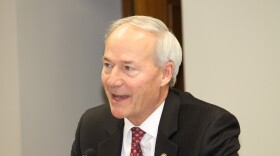Arkansas’s Republican Governor Asa Hutchinson is moving forward with Medicaid expansion and seeking federal approval for new adjustments to what has been known as the private option. The Health Care Task Force endorsed Hutchinson’s proposal Wednesday.
The governor entered the healthcare task force meeting with a show of support from the Republican controlled legislature. Hutchinson acknowledged his plan to continue Medicaid expansion – in some form – doesn’t fit neatly with decisions other conservative states made about the Affordable Care Act provision.
“If you look at other Southern governors and other Southern states the position I took was contrary. The position that I took bared some political risk but at the same time I saw it as the right thing to do for Arkansas. I know that you are evaluating all of this in the same light,” said Hutchinson.
However, he also is putting forward a few conservative reforms as a condition of continuing expansion.
“I call it ‘Arkansas Works’. There’s nothing magical about a name but I think Arkansas Works is descriptive of where we want to go,” he said without naming the current program moniker, the private option.
Hutchinson wants federal approval to shift Medicaid beneficiaries to employer-based coverage when possible; require referrals for workforce training; and some to pay small premiums. But Arkansas Works might not work for all conservatives, like State Senator Terry Rice.
“I have not supported Obamacare. I have opposed the private option. I think it will collapse in time,” said Rice. “It would be an improvement to what came out of Washington D.C. but I wouldn’t say it works for me.”
While Rice expressed tempered opposition after the task force vote he did not voice his opposition during the vote. No one voted nay during a voice vote.
Joe Farrar is a state Representative who voted against Medicaid expansion in 2013 but lent support earlier this year and after the task force meeting - even though Hutchinson’s waivers stop short of his ideal.
“It’s just what we can get right now. If we had a strong conservative Republican president and we went in there and said, ‘we want this population to be drug tested, we want this population to have jobs, we want this population to A, B, C, and D’ and we got that, then great. But we don’t have that option right now,” said Farrar commenting on what the Centers for Medicaid and Medicare Services has approved for other states. “We have a president right now that’s not going to let us do that.”
A number of "aspirational" waivers were mentioned by the governor including limits on lifetime benefits and asset testing.
Hutchinson said Arkansas needs to continue coverage, in part for the well being of 250,000 low-income beneficiaries, and because keeping it is good for the state budget. Task force Chair Charlie Collins, a state Representative from Fayetteville, elicited as much from the governor.
COLLINS: We would need to come up with $1.5 billion in savings. Just so we don’t get confused and think if we just eliminate Medicaid expansion we’ve solved our spending challenges. I just want to make sure I’m in sync with you sir.
HUTCHINSON: Representative Collins you have expressed it precisely correctly. I would just say that if we do not do this we would have one challenge in the fiscal session.
However, Hutchinson argues to keep Medicaid expansion the state needs to find $843 million in savings over a five year period beginning in 2017 from traditional Medicaid for when the state starts picking up part of the cost of Medicaid expansion, leveling out at 10 percent in 2021. Though consultants the Stephen Group have reported finding that even when Arkansas begins contributing to the program it still would save the state money overall.
“My bottom is line is we have to achieve the savings. As to how you get there is a fair debate that are huge policy decisions,” the governor said.
The debate over managed care, Patient Centered Medical Homes, third-party administrators and how to handle high-cost populations related to long-term care, disability, and behavioral health will be fought out in the months ahead.
For now, Hutchinson plans to negotiate Medicaid expansion waivers with federal Medicaid officials in January. He hopes for a final draft in April with a special session to follow. The existing private option expires at the end of 2016. The task force was charged with finding a way to continue coverage and find savings as part of legislation earlier this year that set an end date for the private option, which uses Medicaid funds to purchase private insurance for people between 17-138 percent of the federal poverty level.






